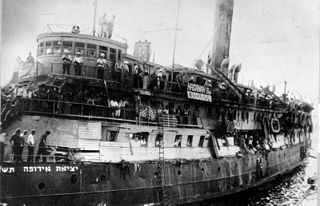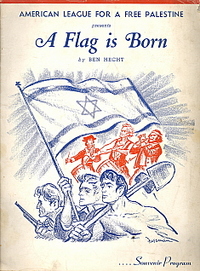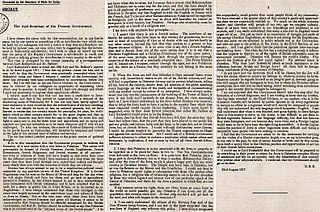Related Research Articles

The Balfour Declaration was a public statement issued by the British Government in 1917 during the First World War announcing its support for the establishment of a "national home for the Jewish people" in Palestine, then an Ottoman region with a small minority Jewish population. The declaration was contained in a letter dated 2 November 1917 from the United Kingdom's Foreign Secretary Arthur Balfour to Lord Rothschild, a leader of the British Jewish community, for transmission to the Zionist Federation of Great Britain and Ireland. The text of the declaration was published in the press on 9 November 1917.

Zionism is an ethno-cultural nationalist movement that emerged in Europe in the late 19th century and aimed for the establishment of a Jewish state through the colonization of a land outside of Europe. It eventually focused on the establishment of a Jewish homeland in Palestine, a region corresponding to the Land of Israel in Judaism, and of central importance in Jewish history. Following the establishment of the State of Israel in 1948, Zionism became the ideology supporting the protection and development of Israel as a Jewish state, in particular, a state with a Jewish demographic majority, and has been described as Israel's national or state ideology.

Chaim Azriel Weizmann 27 November 1874 – 9 November 1952) was a Russian-born biochemist, Zionist leader and Israeli statesman who served as president of the Zionist Organization and later as the first president of Israel. He was elected on 16 February 1949, and served until his death in 1952. Weizmann was instrumental in obtaining the Balfour Declaration of 1917 and convincing the United States government to recognize the newly formed State of Israel in 1948.

The Jewish Agency for Israel, formerly known as the Jewish Agency for Palestine, is the largest Jewish non-profit organization in the world. It was established in 1929 as the operative branch of the World Zionist Organization (WZO).

A homeland for the Jewish people is an idea rooted in Jewish history, religion, and culture. The Jewish aspiration to return to Zion, generally associated with divine redemption, has suffused Jewish religious thought since the destruction of the First Temple and the Babylonian exile.

Ze'ev Jabotinsky was a Revisionist Zionist leader, author, poet, orator, soldier, and founder of the Jewish Self-Defense Organization in Odessa.

Deborah Esther Lipstadt is an American historian and diplomat, best known as author of the books Denying the Holocaust (1993), History on Trial: My Day in Court with a Holocaust Denier (2005), The Eichmann Trial (2011), and Antisemitism: Here and Now (2019). She has served as the United States Special Envoy for Monitoring and Combating Anti-Semitism since May 3, 2022. Since 1993 she has been the Dorot Professor of Modern Jewish History and Holocaust Studies at Emory University in Atlanta, Georgia, US.

The Jewish Infantry Brigade Group, more commonly known as the Jewish Brigade Group or Jewish Brigade, was a military formation of the British Army in the Second World War. It was formed in late 1944 and was recruited among Yishuv Jews from Mandatory Palestine and commanded by Anglo-Jewish officers. It served in the latter stages of the Italian Campaign, and was disbanded in 1946.
Mahmoud Ahmadinejad was President of Iran from 3 August 2005 to 3 August 2013, and during that time had repeatedly made contentious speeches and statements against Israel. Ahmadinejad refused to call Israel by name, instead calling it the “Zionist regime”. He has called for the "elimination of the Zionist regime". Ahmadinejad took part in a protest called "The World Without Zionism" and has derided Israel on numerous occasions. He has urged regional powers to cut diplomatic and economic ties with Israel and halt oil sales. Tensions have risen over Iran's nuclear program. He has also provided funding, training and arms to Hezbollah and Hamas.
The Gathering of Israel, or the Ingathering of the Jewish diaspora, is the biblical promise of Deuteronomy 30:1–5, made by Moses to the Israelites prior to their entry into the Land of Israel.

Yisroel Dovid Weiss is an American Jew, activist, and spokesman for the worldwide religious group Neturei Karta, an anti-Zionist group. Residing in Monsey, New York, he believes that Jews should peacefully oppose the existence of the Israeli state: "It would be forbidden for us to have a State, even if it would be in a land that is desolate and uninhabited." He emphasized the need for a complete return of land to Palestinians, rejecting the '67 borders and advocating coexistence.
As an organized nationalist movement, Zionism is generally considered to have been founded by Theodor Herzl in 1897. However, the history of Zionism began earlier and is intertwined with Jewish history and Judaism. The organizations of Hovevei Zion, held as the forerunners of modern Zionist ideals, were responsible for the creation of 20 Jewish towns in Palestine between 1870 and 1897.
Muslim supporters of Israel refers to both Muslims and cultural Muslims who support the right to self-determination of the Jewish people and the likewise existence of a Jewish homeland in the Southern Levant, traditionally known as the Land of Israel and corresponding to the modern polity known as the State of Israel. Muslim supporters of the Israeli state are widely considered to be a rare phenomenon in light of the ongoing Israeli–Palestinian conflict and the larger Arab–Israeli conflict. Within the Muslim world, the legitimacy of the State of Israel has been challenged since its inception, and support for Israel's right to exist is a minority orientation. Pro-Israel Muslims have faced opposition from both moderate Muslims and Islamists.

A Flag Is Born is a 1946 play that advocated the creation of a homeland for the Jewish people in the ancient Land of Israel—at the time of the play's release Mandatory Palestine, under British administration. With a cast including Paul Muni, Celia Adler and Marlon Brando, it opened on Broadway on September 4, 1946. It was written by Ben Hecht and directed by Luther Adler, with music by Kurt Weill. A Flag Is Born was produced by the American League for a Free Palestine, an organization headed by Hillel Kook, to raise money for Zionist causes.

Norman Gary Finkelstein is an American political scientist and activist. His primary fields of research are the politics of the Holocaust and the Israeli–Palestinian conflict.

Anti-Zionism is opposition to Zionism. Although anti-Zionism is a heterogeneous phenomenon, all its proponents agree that the creation of the modern State of Israel, and the movement to create a sovereign Jewish state in the region of Palestine—a region partly coinciding with the biblical Land of Israel—was flawed or unjust in some way.
The American Palestine Committee was a political lobby group in the United States founded in 1932 to influence American policy towards the establishment of a Jewish national home in Palestine, an aim achieved in 1948 with U.S. support for the Partition of Palestine and subsequent recognition of the new state of Israel.
Marshall Allen Flaum was an American Emmy Award-winning documentary and television director, producer and screenwriter. In addition to his five Emmy Awards, Flaum earned two Academy Award nominations for his work on the documentary films The Yanks Are Coming in 1963 and Let My People Go: The Story of Israel in 1965.
This timeline of anti-Zionism chronicles the history of anti-Zionism, including events in the history of anti-Zionist thought.
Zionist antisemitism or antisemitic Zionism refers to a phenomenon in which antisemites express support for Zionism and the State of Israel. In some cases, this support may be promoted for explicitly antisemitic reasons. Historically, this type of antisemitism has been most notable among Christian Zionists, who may perpetrate religious antisemitism while being outspoken in their support for Jewish sovereignty in Israel due to their interpretation of Christian eschatology. Similarly, people who identify with the political far-right, particularly in Europe and the United States, may support the Zionist movement because they seek to expel Jews from their country and see Zionism as the least complicated method of achieving this goal and satisfying their racial antisemitism.
References
- ↑ "The 38th Academy Awards (1966) Nominees and Winners". oscars.org. Archived from the original on January 11, 2015. Retrieved May 19, 2019.
- ↑ "Marshall Flaum dies at 85; award-winning documentary maker". Los Angeles Times . October 6, 2010. Retrieved October 9, 2010.
- ↑ "LET MY PEOPLE GO" Archived May 15, 2011, at the Wayback Machine , Cinematographie des Holocaust. Accessed October 9, 2010.
- 1 2 3 Gould, Jack. "TV Review; Israel's Story Told in 'Let My People Go'", The New York Times , April 9, 1965. Accessed October 9, 2010.
- ↑ Kirkley, Donald. "Look and Listen with Donald Kirkley", The Baltimore Sun , April 8, 1965. Accessed October 9, 2010.